新目标英语八年级下册Unit 3 Could you please clean your room单元要点精讲课件
文档属性
| 名称 | 新目标英语八年级下册Unit 3 Could you please clean your room单元要点精讲课件 |
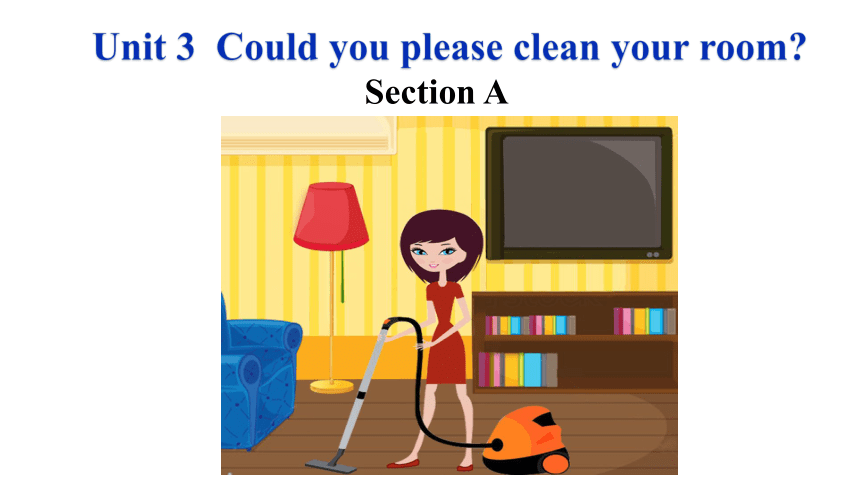
|
|
| 格式 | zip | ||
| 文件大小 | 566.8KB | ||
| 资源类型 | 教案 | ||
| 版本资源 | 人教新目标(Go for it)版 | ||
| 科目 | 英语 | ||
| 更新时间 | 2018-03-03 00:00:00 | ||
图片预览

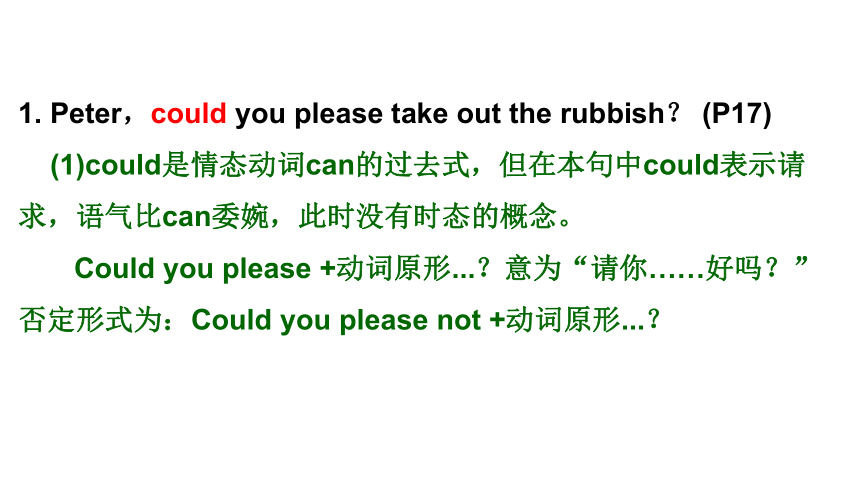
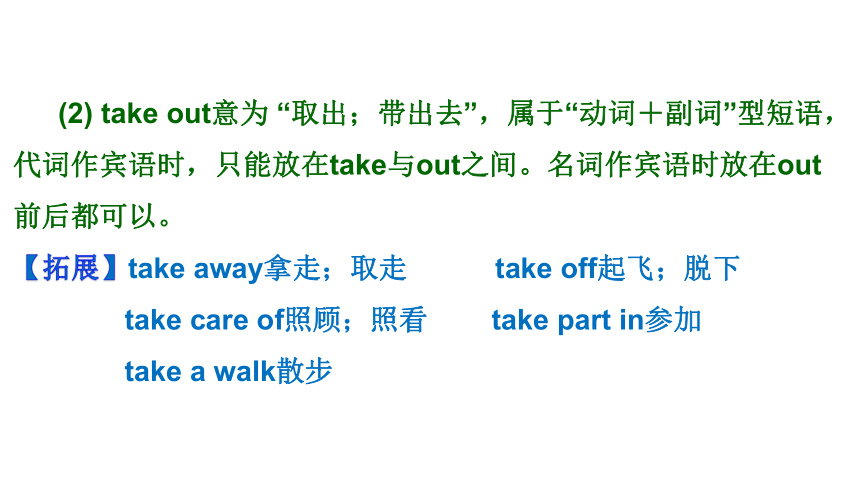
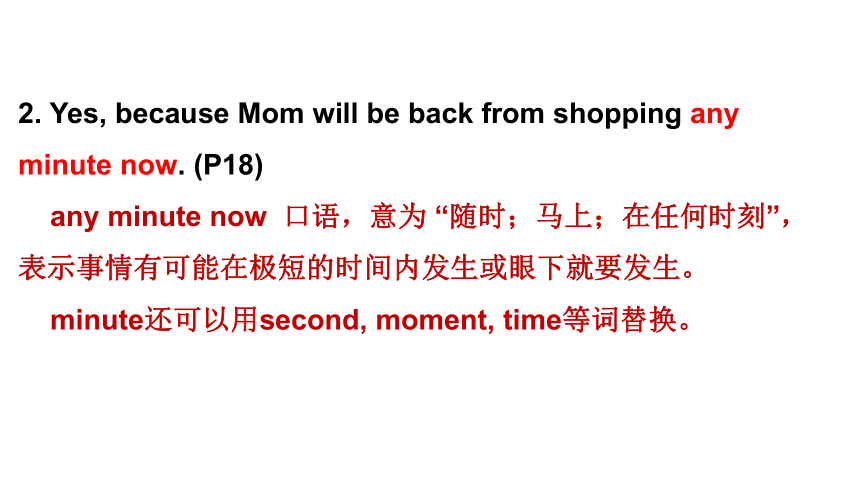
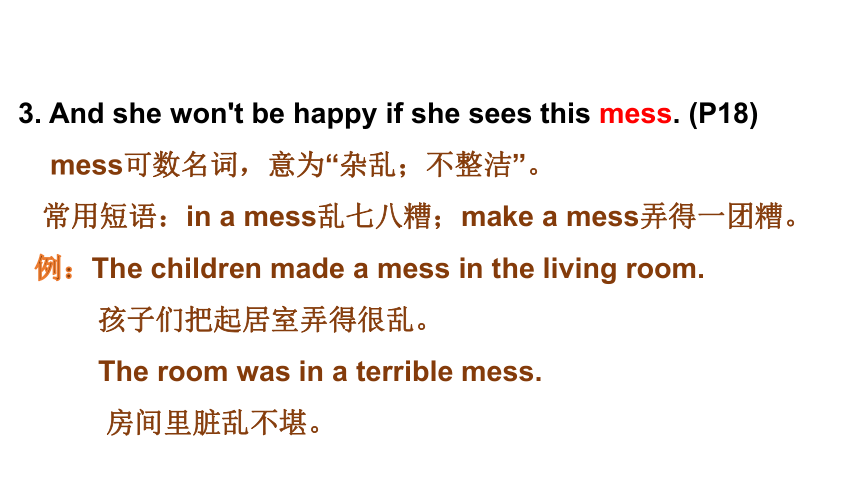
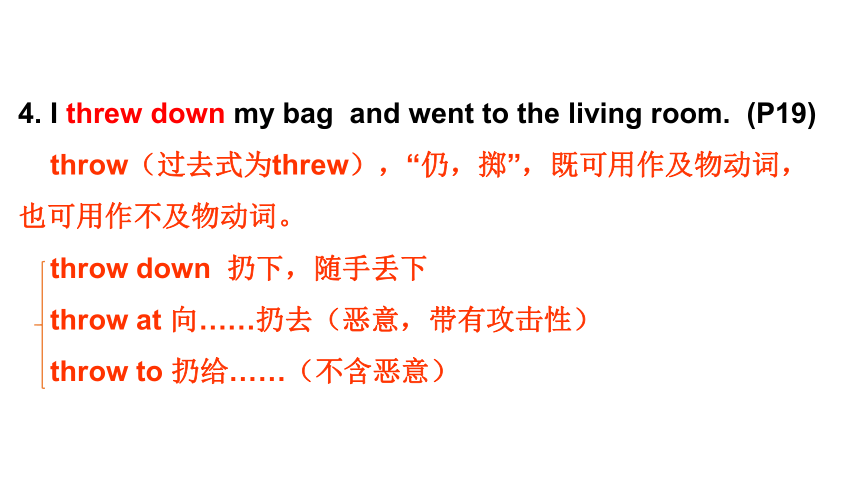
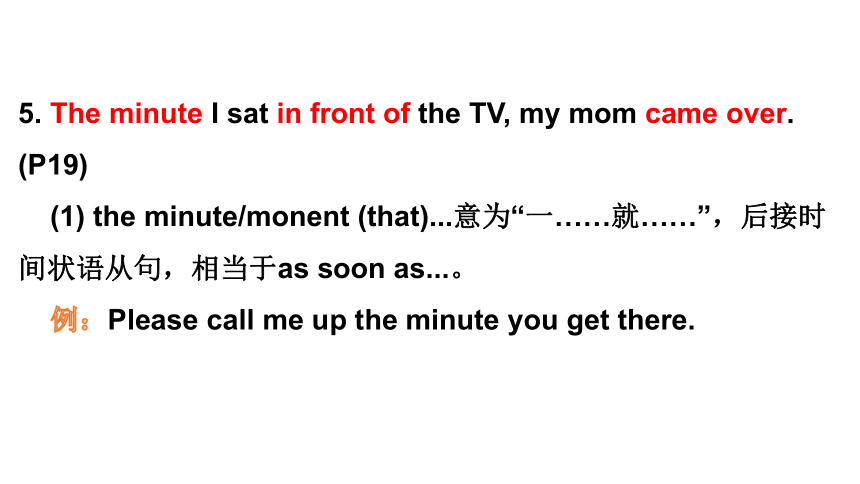
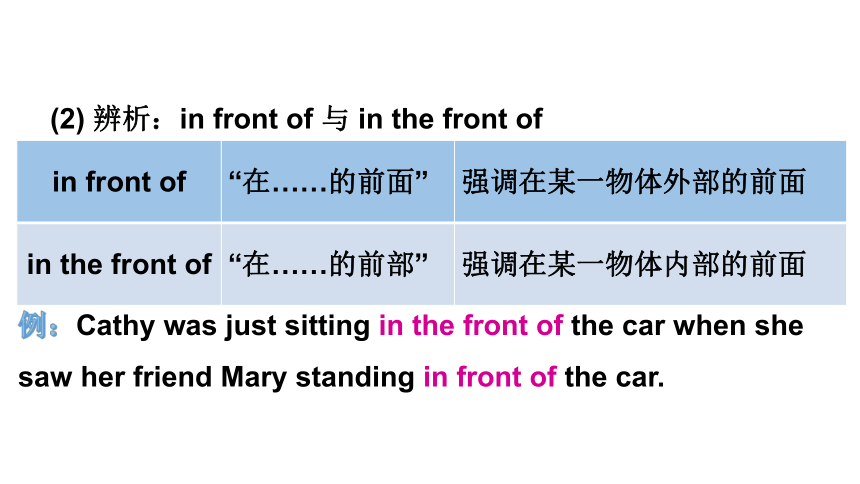
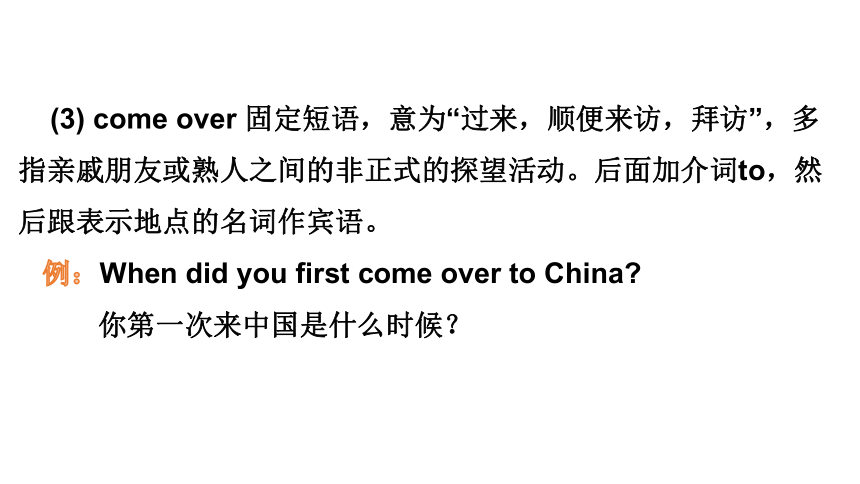
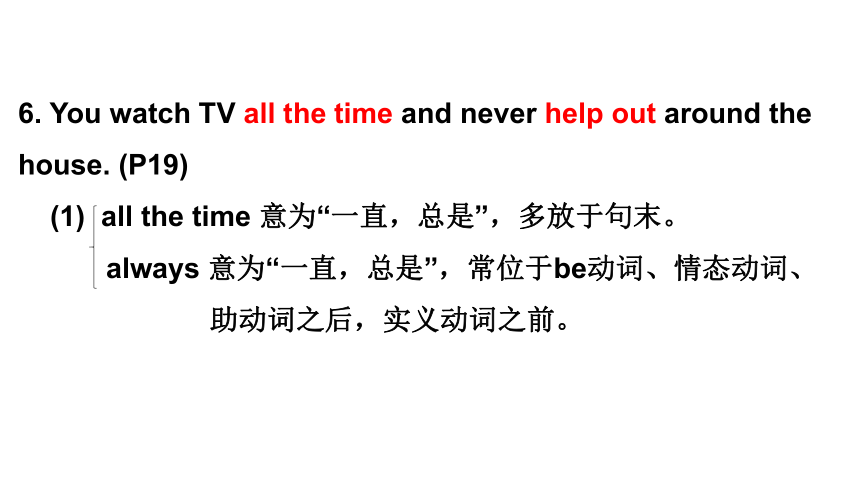
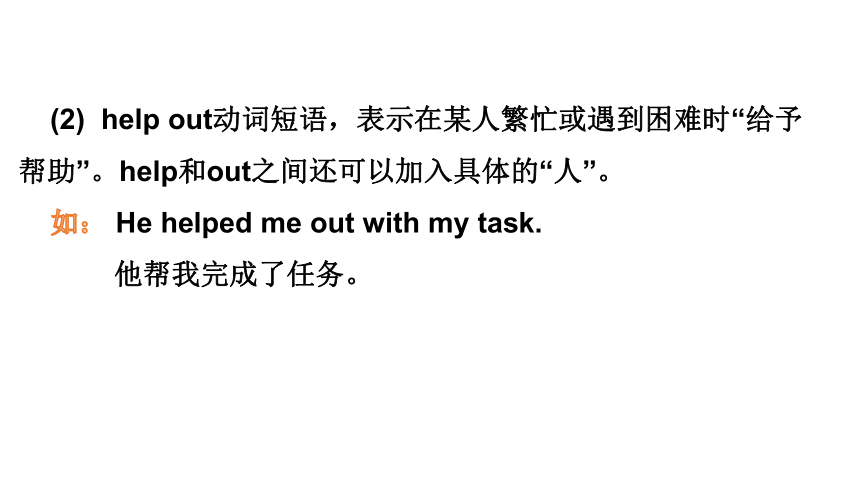
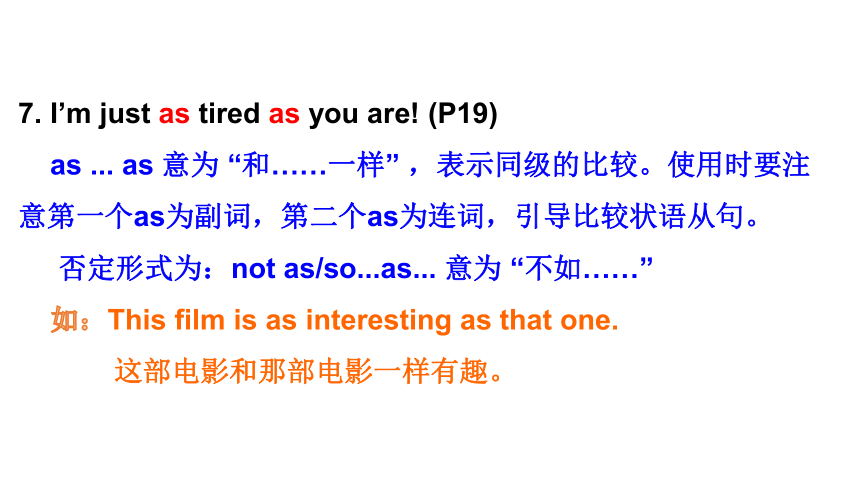
文档简介
课件60张PPT。Unit 3 Could you please clean your room?
Section A1. Peter,could you please take out the rubbish? (P17)
(1)could是情态动词can的过去式,但在本句中could表示请求,语气比can委婉,此时没有时态的概念。
Could you please +动词原形...?意为“请你……好吗?”否定形式为:Could you please not +动词原形...? (2) take out意为 “取出;带出去”,属于“动词+副词”型短语,代词作宾语时,只能放在take与out之间。名词作宾语时放在out前后都可以。
【拓展】take away拿走;取走 take off起飞;脱下
take care of照顾;照看 take part in参加
take a walk散步2. Yes, because Mom will be back from shopping any minute now. (P18)
any minute now 口语,意为 “随时;马上;在任何时刻”,表示事情有可能在极短的时间内发生或眼下就要发生。
minute还可以用second, moment, time等词替换。3. And she won't be happy if she sees this mess. (P18)
mess可数名词,意为“杂乱;不整洁”。
常用短语:in a mess乱七八糟;make a mess弄得一团糟。
例:The children made a mess in the living room.
孩子们把起居室弄得很乱。
The room was in a terrible mess.
房间里脏乱不堪。4. I threw down my bag and went to the living room. (P19)
throw(过去式为threw),“仍,掷”,既可用作及物动词,也可用作不及物动词。
throw down 扔下,随手丢下
throw at 向……扔去(恶意,带有攻击性)
throw to 扔给……(不含恶意) 5. The minute I sat in front of the TV, my mom came over. (P19)
(1) the minute/monent (that)...意为“一……就……”,后接时间状语从句,相当于as soon as...。
例:Please call me up the minute you get there. (2) 辨析:in front of 与 in the front of
例:Cathy was just sitting in the front of the car when she saw her friend Mary standing in front of the car.
(3) come over 固定短语,意为“过来,顺便来访,拜访”,多指亲戚朋友或熟人之间的非正式的探望活动。后面加介词to,然后跟表示地点的名词作宾语。
例:When did you first come over to China?
你第一次来中国是什么时候?6. You watch TV all the time and never help out around the house. (P19)
(1) all the time 意为“一直,总是”,多放于句末。
always 意为“一直,总是”,常位于be动词、情态动词、
助动词之后,实义动词之前。 (2) help out动词短语,表示在某人繁忙或遇到困难时“给予帮助”。help和out之间还可以加入具体的“人”。
如: He helped me out with my task.
他帮我完成了任务。7. I’m just as tired as you are! (P19)
as ... as 意为 “和……一样” ,表示同级的比较。使用时要注意第一个as为副词,第二个as为连词,引导比较状语从句。
否定形式为:not as/so...as... 意为 “不如……”
如:This?film?is?as?interesting?as?that?one.
这部电影和那部电影一样有趣。8. For one week, she did not do any housework and neither did I. (P19)
?neither的用法
①作代词,意为“两者都不”,常用作单数,与介词of连用,作主语时谓语动词用单数形式。
如:He?answered?neither?of?the?letters.? ②作形容词,意为“两者都不”,与单数可数名词连用。作主语时,谓语动词用单数。
如:Neither answer is right.
两个答案都不对。 ③作副词时,意为“也不”,常构成“neither+be动词/情态动词/助动词+主语”结构,用于表示上文的某种否定情况也适用于下文。此时neither可相当于nor。
如:She can't swim,and neither/nor can I.
她不会游泳,我也不会。 【拓展】
?“so+be动词/情态动词/助动词+主语”结构,表示上文的某种肯定情况也适用于下文。
如:They will play soccer tomorrow. So will we.
他们明天去踢足球。我们也去踢。 【拓展】
?“so+主语+be动词/情态动词/助动词”结构,表示对前面所说的情况加以肯定。
如:She knows little English. So she does.
她英语懂得不多。她的确如此。 ④作连词,常用于固定结构“neither...nor...”中,意为“既不……也不……”,连接两个并列成分。当连接两个并列主语时,谓语动词遵循“就近一致”原则。
如:Neither she or he is at home today.
今天她和他都不在家。 【拓展】
?either...or...意为“要么……要么……;或者……或者……”(连接并列主语,谓语动词遵循“就近一致”原则)。
?both...and...意为“……和……;二者都……”(连接并列主语,谓语动词用复数)。一、根据句意及汉语提示写单词。
1.Come to the “tomato fight” in Spain!Once every year,people ________(扔) tomatoes at each other.
2.Adams wore ________(衬衫) instead of white uniforms while visiting patients.throwshirts3.Mother works all day and does housework all evening.She is very _______ (劳累的).
4.Bill doesn't like reading.________ (也不) do I.
5.It's a good idea to _______(分享) the taxi with others.tiredNeithershare二、单项选择。
( )6.—Could you take out the rubbish and do the dishes,Tony?
—Sure,Mom will be mad if she sees this ________,I think. (2016,黄冈)
A.matter B.mess C.trouble D.difficultyB( )7.—Would you like to go shopping?
—I'd like to,but I have to finish ________ my homework first.
A.doing B.to do
C.did D.will doA( )8.There are ________ five new words in this sentence,so it's too difficult for me to understand it.
A.at the least B.at all
C.at most D.at leastD( )9. I tried two bookstores for the book I wanted,but ________ of them had it. (2016,龙东)
A.none B.either C.neither D. all
C( )10.—Which do young people prefer,music or sports?
—Both. Music is ________ sports.
A.as popular as B.not as popular as
C.more popular than D.less popular thanA情态动词could的用法
情态动词could构成的句型用于向对方提出请求或征求对方的许可,表示委婉的语气。语法聚焦①委婉地请求别人做某事时用:Could you (please) do sth?
此句型的肯定答语用:Yes,sure. /Yes,I can. /Of course,I can. /No problem. /With pleasure.等。
否定答语用:Sorry,I can't. I have to... /Sorry,I'm going to... /I'm afraid I can't. I have to...等。②委婉地请求别人允许自己做某事时用:Could I do sth?此句型一般不在I后加please。
肯定回答:Yes,you can. /Yes,please.等。
否定回答:Sorry,you can't. /I'm afraid you can't.等。
【注意】无论是Could you please...?还是Could I...?句型,其答语中一般避免使用could来回答。 borrow,lend与keep
①borrow指向别人借东西,即“借入”。常用于词组borrow sth. from sb.或borrow one's sth.中。
②lend指把东西借给别人,即“借出”。常用于词组lend sth. to sb.或lend sb. sth.中。 ③keep表示“借”,为延续性动词,通常和“for+一段时间”连用,表示“借某物多长时间”。
eg:—Can I borrow your notebook?
—Of course,and I will lend you my textbook. You can keep it for two days.一、单项选择。
1.—Could you help me put up the maps on the wall?
—____.
A.No problem B.I hope so
C.That's all right D.That's a good ideaA2.—So many people!Could I stand here?
—____.Don't you see the sign “Line up,please”?
A.My pleasure B.No problem
C.Of course D.Sorry,you can'tD3.—Cathy,could you come to our art club tomorrow?
—____.
A.I'm sorry to hear that
B.Sure,I'd love to
C.Never mind
D.You're welcomeB4.—Could I borrow your camera?
—____,but please give it back by Saturday.
A.I'm sorry B.Of course
C.Certainly not D.No,thanksB二、按要求完成下列句子。
5.Do you let me go to the movies with Bill?(用could改写句子)
________ I ___ to the movies with Bill?
6.—Could you please turn down the TV?(作肯定回答)
—_________,_________.CouldgoSure/YesI can7.—Could I play computer games,Mom?(作否定回答)
—____,___________.
8.Could you please open the door?(改为否定句)
Could you please __________ the door?Noyou can'tnot openUnit 3 Could you please clean your room?
Section B1. buy some drinks and snacks. (P21)
(1)buy (过去式bought),及物动词,“购买;买”。
buy sb. sth. = buy sth. for sb.
(2)drink 可数名词,表示饮料的一杯、一份等,或强调种类;
不可数名词,表示物质;
动词,意为“喝”。1. buy some drinks and snacks. (P21)
如:There are all kinds of drinks in the shop.
商店里有各种各样的饮料。
We can't live for long without food and water.
我们没有食物和水就活不了多久。
Would you like something to drink?
你想喝点什么吗?2. invite my friends to a party. (P21)
invite及物动词,意为“邀请”。名词形式为invitation,意为“邀请;请柬”。
invite sb. to + 地点名词 “邀请某人到某地”。
invite sb. to do sth. “邀请某人做某事”。3. I don't understand why some parents make their kids help with housework and chores at home. (P22)
(1) make sb. do sth. “使/让某人做某事”。
(2) help with sth. 意为“帮忙做某事”。
=help (to) do sth. 4. Housework is a waste of their time. (P22)
① waste在此处用作名词,意为“浪费;滥用”。a waste of time“浪费时间”。waste作名词,还可意为“垃圾;废弃物”,常用其复数wastes形式。
②waste还可作动词,意为“浪费”,其反义词为save。
waste time/money on sb/sth. “在……上浪费时间/金钱”。
waste time/money (in) doing sth. “浪费时间/金钱做某事”。4. Housework is a waste of their time. (P22)
③waste还可作形容词,意为“荒芜的;浪费的;无用的”。
如:It's only a waste of time to speak to her.
I don't like to waste your time.
Jack wastes a lot of time watching TV.
A factory is pouring waste water into the river.5. They should spend their time on schoolwork in order to get good grades. (P22)
in order to意为“目的是,为了”, 用来引导目的状语,表目的。其后接动词原形;可以放在句首,也可位于句中,其否定式为:in order not to。
in order that也意为“为了”,其后常接一个句子。6. It is the parents’ job to provide a clean and comfortable environment at home for their children.(P22)
①此处it为形式主语,真正的主语是后面的动词不定式短语。
②It's one's job /duty /... to do sth. “做某事是某人的工作/职责/……”
③provide动词,意为“提供;供应”。后可接名词或代词作简单宾语,还可接双宾语。6. It is the parents’ job to provide a clean and comfortable environment at home for their children.(P22)
provide sth.for sb.
= provide sb.with sth.“为某人提供某物”。
如:Mr. Smith provided food for us.
= Mr. Smith provided us(with) food.
史密斯先生为我们提供食物。7. Doing chores helps to develop children's independence and teaches them how to look after themselves. (P22)
(1) develop此处用作及物动词,也可用作不及物动词,意为“发展;壮大”。其名词形式为development,意为“发展;发育”。
develop的形容词有两个: developed “发达的”。
developing “发展中的”。 7. Doing chores helps to develop children's independence and teaches them how to look after themselves. (P22)
(2) independence不可数名词,意为“独立”,其形容词为 independent,意为 “独立的;自主的”。
如:He wants to live a life of independence.
China is an independent country.8. As a result, he often fell ill and his grades dropped. (P22)
(1) as a result 意为 “结果;因此”。
as a result of 意为“由于……;作为……的结果”。
(2) fall ill是固定短语,意为“生病”,此处fall是连系动词,其后接形容词作表语。8. As a result, he often fell ill and his grades dropped. (P22)
(3) ill 用作形容词,意为“有病;不舒服”,常作表语。
ill “有病,不舒服”,用作表语,不能作定语。
sick “生病的;有病的”,既可作表语又可作定语。
the sick 意为“病人”。8. As a result, he often fell ill and his grades dropped. (P22)
(4) drop (过去式为dropped),此处用作及物动词,意为“落下;掉下”。
eg: The cup dropped and broke.
杯子掉下来摔碎了。单项选择。
( )1.—Why are you so excited?(2016,郴州)
—Nancy invited me ________ on a trip to Dongjiang Lake just now.
A.to go B.go C.going D. went A( )2.—Can I ________ your dictionary?
—Of course. But you mustn't ________ it to others.
A.lend;lend B.lend;borrow
C.borrow;lend D.borrow;borrow
C( )3.Could you please ________ loudly here?Emma is doing her homework.
A.don't talk B.not talk
C.no talk D.not to talkB( ) 4.—My English is so weak.Can you help me,Gina?
—Practice more and the most important is to ________ a good habit of reading. (2016,荆州)
A.make B.complete C.develop D.showC( ) 5. I enjoy playing computer games,but I can't ________ too much time ________ that.
A.take;doing B.spend;doing
C.spend;for doing D.take;to doB( )6. —Would you please provide us ________ some information about the school sports meeting?
—Sure. It's said that it will start ________ the morning of September 20th.
A.for;on B.with;on
C.for;in D.with;inB( )7. Don't ________ any more time,or we will miss the meeting.(2016,天津)
A.save B.trust C.waste D.love
C( )8. —Are you going to have a part time job during the summer vacation?
—Yes. I think I shouldn't always ________ my parents since I've grown up. (2016,襄阳)
A.fight against B.argue with
C.hear from D.depend onD
Section A1. Peter,could you please take out the rubbish? (P17)
(1)could是情态动词can的过去式,但在本句中could表示请求,语气比can委婉,此时没有时态的概念。
Could you please +动词原形...?意为“请你……好吗?”否定形式为:Could you please not +动词原形...? (2) take out意为 “取出;带出去”,属于“动词+副词”型短语,代词作宾语时,只能放在take与out之间。名词作宾语时放在out前后都可以。
【拓展】take away拿走;取走 take off起飞;脱下
take care of照顾;照看 take part in参加
take a walk散步2. Yes, because Mom will be back from shopping any minute now. (P18)
any minute now 口语,意为 “随时;马上;在任何时刻”,表示事情有可能在极短的时间内发生或眼下就要发生。
minute还可以用second, moment, time等词替换。3. And she won't be happy if she sees this mess. (P18)
mess可数名词,意为“杂乱;不整洁”。
常用短语:in a mess乱七八糟;make a mess弄得一团糟。
例:The children made a mess in the living room.
孩子们把起居室弄得很乱。
The room was in a terrible mess.
房间里脏乱不堪。4. I threw down my bag and went to the living room. (P19)
throw(过去式为threw),“仍,掷”,既可用作及物动词,也可用作不及物动词。
throw down 扔下,随手丢下
throw at 向……扔去(恶意,带有攻击性)
throw to 扔给……(不含恶意) 5. The minute I sat in front of the TV, my mom came over. (P19)
(1) the minute/monent (that)...意为“一……就……”,后接时间状语从句,相当于as soon as...。
例:Please call me up the minute you get there. (2) 辨析:in front of 与 in the front of
例:Cathy was just sitting in the front of the car when she saw her friend Mary standing in front of the car.
(3) come over 固定短语,意为“过来,顺便来访,拜访”,多指亲戚朋友或熟人之间的非正式的探望活动。后面加介词to,然后跟表示地点的名词作宾语。
例:When did you first come over to China?
你第一次来中国是什么时候?6. You watch TV all the time and never help out around the house. (P19)
(1) all the time 意为“一直,总是”,多放于句末。
always 意为“一直,总是”,常位于be动词、情态动词、
助动词之后,实义动词之前。 (2) help out动词短语,表示在某人繁忙或遇到困难时“给予帮助”。help和out之间还可以加入具体的“人”。
如: He helped me out with my task.
他帮我完成了任务。7. I’m just as tired as you are! (P19)
as ... as 意为 “和……一样” ,表示同级的比较。使用时要注意第一个as为副词,第二个as为连词,引导比较状语从句。
否定形式为:not as/so...as... 意为 “不如……”
如:This?film?is?as?interesting?as?that?one.
这部电影和那部电影一样有趣。8. For one week, she did not do any housework and neither did I. (P19)
?neither的用法
①作代词,意为“两者都不”,常用作单数,与介词of连用,作主语时谓语动词用单数形式。
如:He?answered?neither?of?the?letters.? ②作形容词,意为“两者都不”,与单数可数名词连用。作主语时,谓语动词用单数。
如:Neither answer is right.
两个答案都不对。 ③作副词时,意为“也不”,常构成“neither+be动词/情态动词/助动词+主语”结构,用于表示上文的某种否定情况也适用于下文。此时neither可相当于nor。
如:She can't swim,and neither/nor can I.
她不会游泳,我也不会。 【拓展】
?“so+be动词/情态动词/助动词+主语”结构,表示上文的某种肯定情况也适用于下文。
如:They will play soccer tomorrow. So will we.
他们明天去踢足球。我们也去踢。 【拓展】
?“so+主语+be动词/情态动词/助动词”结构,表示对前面所说的情况加以肯定。
如:She knows little English. So she does.
她英语懂得不多。她的确如此。 ④作连词,常用于固定结构“neither...nor...”中,意为“既不……也不……”,连接两个并列成分。当连接两个并列主语时,谓语动词遵循“就近一致”原则。
如:Neither she or he is at home today.
今天她和他都不在家。 【拓展】
?either...or...意为“要么……要么……;或者……或者……”(连接并列主语,谓语动词遵循“就近一致”原则)。
?both...and...意为“……和……;二者都……”(连接并列主语,谓语动词用复数)。一、根据句意及汉语提示写单词。
1.Come to the “tomato fight” in Spain!Once every year,people ________(扔) tomatoes at each other.
2.Adams wore ________(衬衫) instead of white uniforms while visiting patients.throwshirts3.Mother works all day and does housework all evening.She is very _______ (劳累的).
4.Bill doesn't like reading.________ (也不) do I.
5.It's a good idea to _______(分享) the taxi with others.tiredNeithershare二、单项选择。
( )6.—Could you take out the rubbish and do the dishes,Tony?
—Sure,Mom will be mad if she sees this ________,I think. (2016,黄冈)
A.matter B.mess C.trouble D.difficultyB( )7.—Would you like to go shopping?
—I'd like to,but I have to finish ________ my homework first.
A.doing B.to do
C.did D.will doA( )8.There are ________ five new words in this sentence,so it's too difficult for me to understand it.
A.at the least B.at all
C.at most D.at leastD( )9. I tried two bookstores for the book I wanted,but ________ of them had it. (2016,龙东)
A.none B.either C.neither D. all
C( )10.—Which do young people prefer,music or sports?
—Both. Music is ________ sports.
A.as popular as B.not as popular as
C.more popular than D.less popular thanA情态动词could的用法
情态动词could构成的句型用于向对方提出请求或征求对方的许可,表示委婉的语气。语法聚焦①委婉地请求别人做某事时用:Could you (please) do sth?
此句型的肯定答语用:Yes,sure. /Yes,I can. /Of course,I can. /No problem. /With pleasure.等。
否定答语用:Sorry,I can't. I have to... /Sorry,I'm going to... /I'm afraid I can't. I have to...等。②委婉地请求别人允许自己做某事时用:Could I do sth?此句型一般不在I后加please。
肯定回答:Yes,you can. /Yes,please.等。
否定回答:Sorry,you can't. /I'm afraid you can't.等。
【注意】无论是Could you please...?还是Could I...?句型,其答语中一般避免使用could来回答。 borrow,lend与keep
①borrow指向别人借东西,即“借入”。常用于词组borrow sth. from sb.或borrow one's sth.中。
②lend指把东西借给别人,即“借出”。常用于词组lend sth. to sb.或lend sb. sth.中。 ③keep表示“借”,为延续性动词,通常和“for+一段时间”连用,表示“借某物多长时间”。
eg:—Can I borrow your notebook?
—Of course,and I will lend you my textbook. You can keep it for two days.一、单项选择。
1.—Could you help me put up the maps on the wall?
—____.
A.No problem B.I hope so
C.That's all right D.That's a good ideaA2.—So many people!Could I stand here?
—____.Don't you see the sign “Line up,please”?
A.My pleasure B.No problem
C.Of course D.Sorry,you can'tD3.—Cathy,could you come to our art club tomorrow?
—____.
A.I'm sorry to hear that
B.Sure,I'd love to
C.Never mind
D.You're welcomeB4.—Could I borrow your camera?
—____,but please give it back by Saturday.
A.I'm sorry B.Of course
C.Certainly not D.No,thanksB二、按要求完成下列句子。
5.Do you let me go to the movies with Bill?(用could改写句子)
________ I ___ to the movies with Bill?
6.—Could you please turn down the TV?(作肯定回答)
—_________,_________.CouldgoSure/YesI can7.—Could I play computer games,Mom?(作否定回答)
—____,___________.
8.Could you please open the door?(改为否定句)
Could you please __________ the door?Noyou can'tnot openUnit 3 Could you please clean your room?
Section B1. buy some drinks and snacks. (P21)
(1)buy (过去式bought),及物动词,“购买;买”。
buy sb. sth. = buy sth. for sb.
(2)drink 可数名词,表示饮料的一杯、一份等,或强调种类;
不可数名词,表示物质;
动词,意为“喝”。1. buy some drinks and snacks. (P21)
如:There are all kinds of drinks in the shop.
商店里有各种各样的饮料。
We can't live for long without food and water.
我们没有食物和水就活不了多久。
Would you like something to drink?
你想喝点什么吗?2. invite my friends to a party. (P21)
invite及物动词,意为“邀请”。名词形式为invitation,意为“邀请;请柬”。
invite sb. to + 地点名词 “邀请某人到某地”。
invite sb. to do sth. “邀请某人做某事”。3. I don't understand why some parents make their kids help with housework and chores at home. (P22)
(1) make sb. do sth. “使/让某人做某事”。
(2) help with sth. 意为“帮忙做某事”。
=help (to) do sth. 4. Housework is a waste of their time. (P22)
① waste在此处用作名词,意为“浪费;滥用”。a waste of time“浪费时间”。waste作名词,还可意为“垃圾;废弃物”,常用其复数wastes形式。
②waste还可作动词,意为“浪费”,其反义词为save。
waste time/money on sb/sth. “在……上浪费时间/金钱”。
waste time/money (in) doing sth. “浪费时间/金钱做某事”。4. Housework is a waste of their time. (P22)
③waste还可作形容词,意为“荒芜的;浪费的;无用的”。
如:It's only a waste of time to speak to her.
I don't like to waste your time.
Jack wastes a lot of time watching TV.
A factory is pouring waste water into the river.5. They should spend their time on schoolwork in order to get good grades. (P22)
in order to意为“目的是,为了”, 用来引导目的状语,表目的。其后接动词原形;可以放在句首,也可位于句中,其否定式为:in order not to。
in order that也意为“为了”,其后常接一个句子。6. It is the parents’ job to provide a clean and comfortable environment at home for their children.(P22)
①此处it为形式主语,真正的主语是后面的动词不定式短语。
②It's one's job /duty /... to do sth. “做某事是某人的工作/职责/……”
③provide动词,意为“提供;供应”。后可接名词或代词作简单宾语,还可接双宾语。6. It is the parents’ job to provide a clean and comfortable environment at home for their children.(P22)
provide sth.for sb.
= provide sb.with sth.“为某人提供某物”。
如:Mr. Smith provided food for us.
= Mr. Smith provided us(with) food.
史密斯先生为我们提供食物。7. Doing chores helps to develop children's independence and teaches them how to look after themselves. (P22)
(1) develop此处用作及物动词,也可用作不及物动词,意为“发展;壮大”。其名词形式为development,意为“发展;发育”。
develop的形容词有两个: developed “发达的”。
developing “发展中的”。 7. Doing chores helps to develop children's independence and teaches them how to look after themselves. (P22)
(2) independence不可数名词,意为“独立”,其形容词为 independent,意为 “独立的;自主的”。
如:He wants to live a life of independence.
China is an independent country.8. As a result, he often fell ill and his grades dropped. (P22)
(1) as a result 意为 “结果;因此”。
as a result of 意为“由于……;作为……的结果”。
(2) fall ill是固定短语,意为“生病”,此处fall是连系动词,其后接形容词作表语。8. As a result, he often fell ill and his grades dropped. (P22)
(3) ill 用作形容词,意为“有病;不舒服”,常作表语。
ill “有病,不舒服”,用作表语,不能作定语。
sick “生病的;有病的”,既可作表语又可作定语。
the sick 意为“病人”。8. As a result, he often fell ill and his grades dropped. (P22)
(4) drop (过去式为dropped),此处用作及物动词,意为“落下;掉下”。
eg: The cup dropped and broke.
杯子掉下来摔碎了。单项选择。
( )1.—Why are you so excited?(2016,郴州)
—Nancy invited me ________ on a trip to Dongjiang Lake just now.
A.to go B.go C.going D. went A( )2.—Can I ________ your dictionary?
—Of course. But you mustn't ________ it to others.
A.lend;lend B.lend;borrow
C.borrow;lend D.borrow;borrow
C( )3.Could you please ________ loudly here?Emma is doing her homework.
A.don't talk B.not talk
C.no talk D.not to talkB( ) 4.—My English is so weak.Can you help me,Gina?
—Practice more and the most important is to ________ a good habit of reading. (2016,荆州)
A.make B.complete C.develop D.showC( ) 5. I enjoy playing computer games,but I can't ________ too much time ________ that.
A.take;doing B.spend;doing
C.spend;for doing D.take;to doB( )6. —Would you please provide us ________ some information about the school sports meeting?
—Sure. It's said that it will start ________ the morning of September 20th.
A.for;on B.with;on
C.for;in D.with;inB( )7. Don't ________ any more time,or we will miss the meeting.(2016,天津)
A.save B.trust C.waste D.love
C( )8. —Are you going to have a part time job during the summer vacation?
—Yes. I think I shouldn't always ________ my parents since I've grown up. (2016,襄阳)
A.fight against B.argue with
C.hear from D.depend onD
同课章节目录
- Unit 1 What's the matter?
- Section A
- Section B
- Unit 2 I'll help to clean up the city parks.
- Section A
- Section B
- Unit 3 Could you please clean your room?
- Section A
- Section B
- Unit 4 Why don't you talk to your parents?
- Section A
- Section B
- Unit 5 What were you doing when the rainstorm came
- Section A
- Section B
- Review of Units 1-5
- Unit 6 An old man tried to move the mountains.
- Section A
- Section B
- Unit 7 What's the highest mountain in the world?
- Section A
- Section B
- Unit 8 Have you read Treasure Island yet?
- Section A
- Section B
- Unit 9 Have you ever been to a museum?
- Section A
- Section B
- Unit 10 I've had this bike for three years.
- Section A
- Section B
